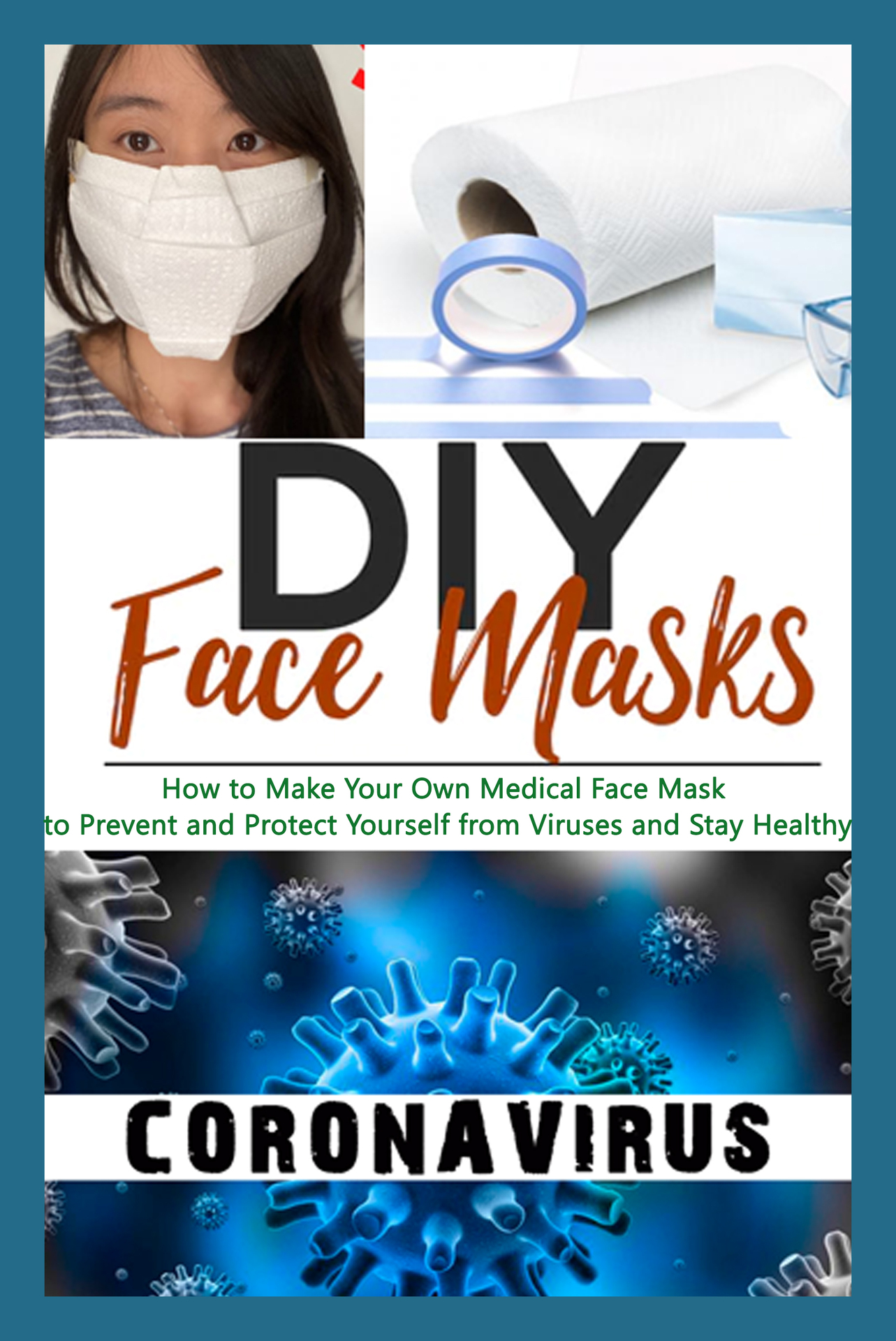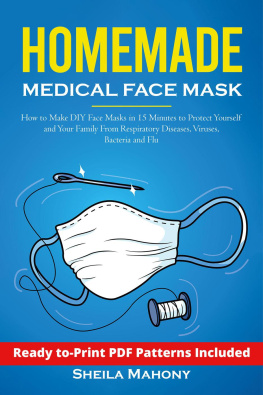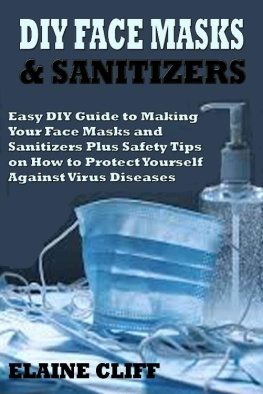DIY Face Masks
How to Make Your Own Medical Face Mask to Prevent and Protect Yourself from Viruses and Stay Healthy
Adrian Belizeard
Copyright 2020 Adrian Belizeard
All rights reserved.
ISBN: 9798630090126
DEDICATION
The author and publisher have provided this e-book to you for your personal use only. You may not make this e-book publicly available in any way. Copyright infringement is against the law. If you believe the copy of this e-book you are reading infringes on the author's copyright, please notify the publisher at: https://us.macmillan.com/piracy
Contents
What is Face Mask?
Facemasks are just one toll employed for preventing the spread of disorder. They might also be called dental, isolation, laser treatment, operation or even surgical masks. Facemasks are loose-fitting masks that cover the mouth and nose, and also have ear pliers or bands or ties at the rear of your mind. There are several diverse brands, and so they are avaiable in various colors. It's crucial ti make use of facemask approved by the FDA.
N95 Respirator Masks, Surgical Masks, and DIY Masks
In the midst of the rapidly spreading COVID-19 pandemic, hospitals and clinics are running out of masks. Healthcare workers are going online to beg for more, the hashtags #GetMePPE and #WeNeedPPE are trending on Twitter, and some hospitals have even put out public calls for mask donations. Health providers are working scared: They know that the moment the masks run out, they're at increased risk for disease. So instead of waiting for mask shipments that may be weeks off, some people are making their own.
At Phoebe Putney Health hospital in Albany, Georgia, staff members and volunteers have been working overtime to make face masks that might provide protection against COVID-19. Using a simple template, they cut green surgical sheeting into half-moons, which they pin and sew before attaching elastic straps. Deaconess Health System in Evansville, Indiana, has posted instructions for fabric masks on their website and asked the public to step up and sew.
Elsewhere, healthcare workers have turned to diapers, maxi pads and other products to create masks. Social media channels are full of tips and sewing patterns. It's an innovative strategy that is also contentious. Limited evidence suggests that homemade masks can offer some protection. But the DIY approach has also drawn criticism for providing a false sense of security, potentially putting wearers at risk.
The conflict points to an immediate need for more protective equipment, says Christopher Friese, PhD, RN, professor of nursing and public health at the University of Michigan, Ann Arbor. Also needed, he says, are new ideas for reducing strain on limited supplies, like adopting gear from other industries and finding innovative ways to provide care so that less protective gear is needed..
N95 Respirators or Surgical Masks?
There are two main types of masks generally used in healthcare. N95 respirators filter out 95% of airborne particles, including bacteria and viruses. The lighter surgical or medical face-masks are made to prevent spit and mucous from getting on patients or equipment.
Both types reduce rates of infection among healthcare workers, though comparisons (at least for influenza) have yet to show that one is superior to the other. One 2020 review by Chinese researchers, for example, analyzed six randomly controlled trials that included more than 9000 participants and found no added benefits of N95 masks over ordinary surgical masks for healthcare providers treating patients with the flu.
But COVID-19 is not influenza, and evidence suggests it may require more intensive protection, says Friese, who coauthored a blog post for JAMA about the country's unpreparedness for protecting healthcare workers during a pandemic. The virus can linger in the air for hours, suggesting that N95 respirators are healthcare providers' best option when treating infected patients..
Homemade masks should be used only as a last resort if commercial masks become unavailable, the researchers concluded. "Probably something is better than nothing for trained healthcare workers for droplet contact avoidance, if nothing else," says Anna Davies, BSc, a research facilitator at the University of Cambridge, UK, who is a former public health microbiologist and one of the study's authors.
The idea that something is better than nothing was also the conclusion of a 2008 study by researchers in the Netherlands and the US. The study enlisted 28 healthy individuals who performed a variety of tasks while wearing N95 masks, surgical masks, or homemade masks sewn from teacloths. Effectiveness varied among individuals, but over a 90-second period, N95 masks worked best, with 25 times more protection than surgical masks and about 50 times more protection than homemade ones. Surgical masks were twice as effective as homemade masks. But the homemade masks offered at least some protection against large droplets.
Researchers emphasize that it's not yet clear whether those findings are applicable to aerosolized COVID-19. In an influenza pandemic, at least, the authors posit that homemade masks could reduce transmission for the general public enough for some immunity to build. "It is important not to focus on a single intervention in case of a pandemic," the researchers write, "but to integrate all effective interventions for optimal protection."
For healthcare workers on the frontlines of COVID-19, Friese says, homemade masks might do more than nothing but they also might not work. Instead, he would rather see providers using construction or nuclear-engineering masks. And his best suggestion is something many providers are already doing: reducing physical contact with patients through telemedicine and other creative solutions, which is cutting down the overwhelming need for PPE.
Homemade mask production emphasizes the urgent need for more supplies, Friese adds.
"The government needs to step up and do a variety of things to increase production, and that needs to happen now, immediately," he says. "We don't we don't want our clinicians to have to come up with these decisions."
Rational use of face masks in the COVID-19 pandemic
Since the outbreak of severe acute respiratory syndrome coronavirus 2 (SARS-CoV-2), the virus that caused coronavirus disease 2019 (COVID-19), the use of face masks has become ubiquitous in China and other Asian countries such as South Korea and Japan. Some provinces and municipalities in China have enforced compulsory face mask policies in public areas; however, China's national guideline has adopted a risk-based approach in offering recommendations for using face masks among health-care workers and the general public. We compared face mask use recommendations by different health authorities (panel). Despite the consistency in the recommendation that symptomatic individuals and those in health-care settings should use face masks, discrepancies were observed in the general public and community settings.
For example, the US Surgeon General advised against buying masks for use by healthy people. One important reason to discourage widespread use of face masks is to preserve limited supplies for professional use in health-care settings. Universal face mask use in the community has also been discouraged with the argument that face masks provide no effective protection against coronavirus infection.
However, there is an essential distinction between absence of evidence and evidence of absence. Evidence that face masks can provide effective protection against respiratory infections in the community is scarce, as acknowledged in recommendations from the UK and Germany.




